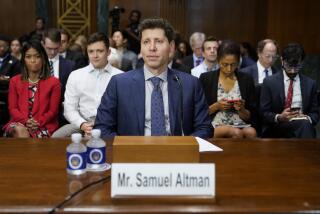Crown Zellerbach Ends Fight With Goldsmith, Names Him Chairman
- Share via
SAN FRANCISCO — Crown Zellerbach Corp. capitulated to Sir James Goldsmith on Thursday, naming the Anglo-French financier chairman of the asset-rich forest products company and awarding him majority representation on Zellerbach’s board.
Analysts said Goldsmith’s victory will speed the restructuring--or, possibly, liquidation--of Zellerbach, a 115-year-old fixture of the West Coast business community.
“There will certainly be significant change,” acknowledged William T. Creson, who relinquished the chairmanship to Goldsmith but will remain president and chief executive.
Creson was interviewed by telephone from New York, where he and Goldsmith met to negotiate terms of Zellerbach’s surrender. The talks began earlier this week after Goldsmith’s stake in Zellerbach’s common shares outstanding topped 50%.
“That dramatically changed the dynamics of the situation,” Creson said. Goldsmith flew home to Paris after hammering out a deal that also affords some protection to Zellerbach’s employees and minority shareholders. He couldn’t be reached for comment Thursday.
Marathon Takeover Battle
Still, after a brief trading halt Thursday, Zellerbach’s shares dropped 75 cents a share to $38.25 on news of the settlement between Goldsmith and Zellerbach.
Goldsmith’s victory caps a marathon five-month takeover battle that featured many firsts. “This is the first hostile takeover that was done below the tender-offer price,” noted Robert Pirie, president of Rothschild Inc., the investment banking firm that advised Goldsmith.
Goldsmith bought most of his Zellerbach shares on the open market for about $41 a share after Zellerbach’s management rebuffed his $42.50-a-share tender offer.
Pirie said he believes that this was also the first takeover battle in which a defensive measure known as a poison pill proved ineffective. The tactic, which was designed to ward off unwanted suitors, may actually have backfired by scaring off potential “white knights” who might have made a friendlier offer to take control of the company.
The poison pill took the form of shareholders’ rights that allow their owners to buy two shares of the surviving company after a merger for the price of one. The rights were irrevocably triggered after Goldsmith boosted his stake in Zellerbach above 20%.
The agreement between Zellerbach and Goldsmith leaves him with something less than total control of the company. Although he’ll have six seats on a reconstituted 11-person board, any combination or other significant business transaction between Zellerbach and companies affiliated with Goldsmith will require the approval of at least 75% of Zellerbach’s board.
Studying Company’s Future
Goldsmith’s General Oriental Securities Limited Partnership also agreed to honor “all employment contracts, directors’ compensation arrangements, severance agreements, stock options and related rights,” so long as they were in effect before Dec. 1, 1984. That is about when Goldsmith signaled that he might try to take control of Zellerbach.
Roland A. E. Franklin, a Goldsmith associate, was named to the new position of vice chairman.
Zellerbach and Goldsmith said the board would set up a six-person committee to study four scenarios for the company’s future. The committee will consist of three Goldsmith designees, including Goldsmith, and three other directors, including Creson. The alternatives to be studied include:
Splitting the company into three entities about as they were originally proposed by Zellerbach’s management, except that the timber-owning entity would be a corporation rather than a limited partnership.
Additional purchases of Zellerbach’s shares by the Goldsmith group.
A self-tender by Zellerbach for about 5 million shares of common stock for $41.50 in cash and/or securities (about 13.5 million are currently not owned by Goldsmith).
Possible transactions with third parties, including the sale of company assets.
The six-director committee “shall explore and analyze ways to maximize the value of the company for all shareholders,” according to a letter of agreement between Goldsmith and Zellerbach, and will report to the full board no later than Nov. 1. The committee will be authorized to retain attorneys and investment advisers at Zellerbach’s expense.
In the wake of Zellerbach’s surrender, “I would envision a process of liquidation of the company,” said Chad E. Brown, a forest products analyst for Kidder, Peabody in New York.
George B. Adler, forest products analyst for Smith Barney, Harris Upham, noted that Zellerbach has many assets that would be of interest to competing pulp and paper companies. He noted that Mead Corp. earlier this year came close to purchasing all of Zellerbach at $50 a share and now has the opportunity to pick and choose from among Zellerbach’s assets.
Zellerbach, which has more than 18,000 employees, had 1984 earnings of $86.9 million on revenue of $3.09 billion.
More to Read
Inside the business of entertainment
The Wide Shot brings you news, analysis and insights on everything from streaming wars to production — and what it all means for the future.
You may occasionally receive promotional content from the Los Angeles Times.










